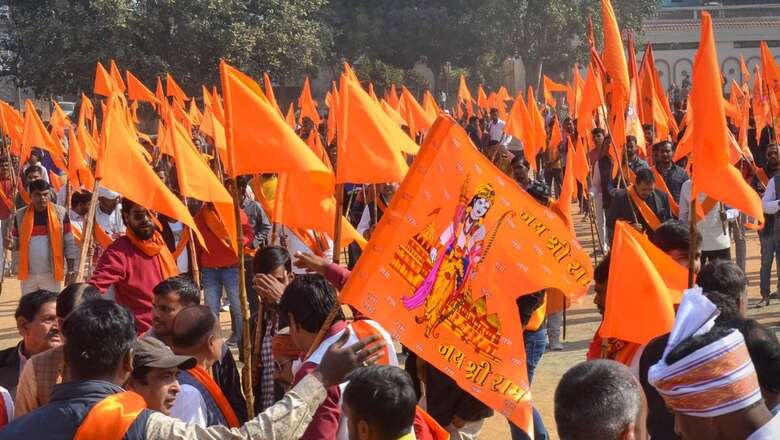
views
It really astonishes me to see how even the so-called intellectuals of the country wax eloquence on a given topic without doing their basic homework or verifying the relevant facts of the issue at hand. The result is that they get it all wrong as the noted writer Chetan Bhagat does in his article, How Much Hate is Too Much (TOI, July 28, 2023). His article suffers from a lack of elementary knowledge, makes sweeping but erroneous assumptions and consequently comes to conclusions that are faulty, to say the least.
The drop head to his article states that “it doesn’t take much for a soft, seemingly harmless bigotry to turn into something reprehensible.” True, what happened in Manipur — the violent killings, the burning of houses and especially the parading of naked women — was reprehensible. But that is where the facts end. The rest is all conjecture that stems from hearsay and weak logic.
To begin, the Manipur violence is not about majoritarianism or Hindutva. Therefore, Chetan Bhagat’s attempt to link the two to formulate an opinion stands on shaky ground. The discord in Manipur is essentially a conflict between two tribes — the Meiteis and the Kukis — and such hostilities are common in the Northeast.
The Meiteis are predominantly Hindu (83 per cent) but there are a significant number of Meitei Muslims, Christians and Sanmahis as well. The Kukis mostly follow Christianity, however, this has not prevented Kukis from attacking Christian Meiteis or razing down Meitei churches. Religion is not the driving force behind this enmity.
With Chetan Bhagat’s basic premise demolished, all his other theories about Hindu ‘entitlement’, bigotry and soft Hindutva fall by the wayside.
He states that “a small section of hardline Indians (read Hindus) want to expel every minority from India.” By the same token, there is a small section of Muslims who want to turn India to Ghazwa-e-Hind and a section of the Christian clergy who desire to convert the entire Hindu community. It is important to understand that all ideologies and religions comprise a wide spectrum of thought with extremes of interpretations. Naxalites, an offshoot of the Communist movement, indulge in systematic and widespread massacre of police and civilians and then we have terrorists who kill in the name of religion. But do we blame all Communists and hold the primary religion responsible for the misdeeds of a few? The answer is in the negative.
Similarly, the Hindutva movement comprises a wide spectrum. At the periphery are people who hold extreme views, and detractors have made every attempt to promote these extremists as representative of this philosophy. The so-called gau rakshaks who indulge in lynchings, or the lumpen elements who rape and maim at will, are not the true votaries of Hindutva and do not reflect the majority view. Attempts to equate the two is rank misinformation.
Amartya Sen, the Nobel Laureate (no fan of Hindutva) concedes this point in The Argumentative Indian (p.53): “…while the hard core of ‘Hindutva’ advocates is relatively small, around them cluster a very much larger group, whom I will call ‘proto-Hindutva’ enthusiasts. They are typically less zealous than the Hindutva champions and are opposed to violence in general (and are typically put off by it) ….”
Ignorance and malicious deception have contributed to making Hindutva (Hindu nationalism) a much-misunderstood and much-maligned ideology. Often, terms like militancy and fundamentalism are used in association with this movement. Therefore, it is important to know what Hindutva is really about. It has developed over hundreds of years and by a series of well-respected thought leaders. I will try to explain in simple terms what Hindutva really stands for.
Hindutva defies precise definition, especially in an alien language like English. People have tried to define it in different ways. Some claim that it is a combination of Hindu and tattva (principles). The closest description of Hindutva in English would be “Hindu-ness.” To me, it is a feeling; a state of mind that has evolved from a deep sense of hurt and one which seeks dignity and justice with civilized assertiveness.
While the term Hindutva was coined by Veer Savarkar, a Hindu nationalist and freedom fighter (against British colonialism) in the 1920s in response to Muslim extremism, the concept of a need for Hindu assertiveness dates back to the times of Shivaji. Shivaji was a 17th-century Hindu chieftain from central India who repulsed the tyrannical Mughal rule of Aurangzeb and restored Hindu primacy to the greater part of India.
Indian history from the 7th century onwards till the 20th century has been one long, tragic story of repeated foreign invasions, inhumane butchery of millions of innocent Hindus, senseless destruction of hundreds of Hindu temples, and economic devastation that reduced one of the richest countries in the world to unimaginable penury. Islamic invaders who reached India’s borders in the 7th century A.D. gave a new meaning and a new dimension to the words destruction, loot, repression and human carnage. The brutalities of this era are clearly corroborated by world historians and are not the fantasies of Hindu nationalists as some in India claim.
American historian Will Durant in The Story of Civilization categorically states that the Islamic conquest of India is “probably the bloodiest story in history.” He adds, “It is a discouraging tale, for its evident moral is that civilization is a precarious thing, whose delicate complex of order and liberty, culture and peace may at any time be overthrown by barbarians invading from without….”
It was in this setting that the process of Hindutva began taking shape. I would have considered it perverse had such all-consuming evil evoked no resistance or response from the Hindus. I would have considered the Hindus effete had they not rebelled against this injustice. It rankles me even today when people try to gloss over these atrocities or attempt to mitigate the magnitude of these crimes. I am willing to forgive, but I am not willing to forget. For to forget is to leave the door open for these atrocities to recur. Subsequent exploitation by the British further helped to strengthen this suspicion of foreigners and their motives.
Independence from the British in 1947 held forth a lot of promise for the Hindu: at last, almost one thousand years of subjugation was coming to an end. Little did he realise that he would continue to be at the receiving end (see the chapter Hindu Anger) as a result of a warped philosophy of Nehruvian secularism, which was the result of the fear of Nazism and ignorance of Hindutva. When one views Hindutva against this background, one realises it is not about superiority. By no means it is a hate rant. But I must admit that it is not poetry of love. Rather, it is a pragmatism that is destined to confer on the Hindu his lost sense of pride, and ensure the protection of his interests. It is the agonising cry for justice and dignity of people long suppressed and tortured; a cry that embodies the agony of the past and a new-found confidence of the present which together hopes to ensure a secure future.
That it is not directed against other religions was made clear even by Savarkar (denigrated as the epitome of hatred) in his treatise, Hindutva: Therefore even from the point of Indian nationality, must ye, O Hindus, consolidate and strengthen Hindu nationality; not to give wanton offence to any of our non-Hindu compatriots, in fact to anyone in the world but in just and urgent defence of our race and land; to render it impossible for others to betray her to or subject her to unprovoked attack by any of those “Pan-isms” that are struggling forth from continent to continent.
The early 1900s were not an age of political correctness and one could have got away with anything one wished to say. The fact that Savarkar expressly underlines his commitment not to offend others is a clear indication that it was not hate that spawned this philosophy. To oppose foreign invasion, to oppose suppression of people is the moral duty of the civilized world. This was and is the basis of Hindutva. The intensity of the morality behind this concept cannot be questioned and I challenge the detractors (which includes professors and so-called academics) of Hindutva to counter this with rational argument, if they have any.
The Supreme Court of India, in one of its verdicts in 1995, re-emphasised what the proponents of Hindutva have been saying all along: it is not a negative philosophy; it is not directed at others. Here is the conclusion of the court: It is a fallacy and an error of law to proceed on the assumption that any reference to Hindutva or Hinduism in a speech makes it automatically a speech based on the Hindu religion as opposed to other religions or that the use of the word Hindutva or Hinduism per se depicts an attitude hostile to all persons practising any religion other than the Hindu religion…and it may well be that these words are used in a speech to emphasise the way of life of the Indian people and the Indian cultural ethos. There is no such presumption permissible in law contrary to several Constitution Bench decisions.
Neither do Hindus exhibit a sense of entitlement. If this were so, there would be provisions favoring them in the Constitution as we see in Pakistan and Bangladesh where all non-Muslims are relegated to second-class status as per the Constitution of those countries. All that the Hindus want is equal rights for all, including Hindus. That is why the BJP is asking for a Uniform Civil Code, not a Hindu First injunction.
Finally, there can be no distinctions like hard or soft Hindutva. Hindutva per se is non-violent: a civilized assertiveness for justice. If there was truly a hard Hindutva, it would have resulted in a hundred Hindu terrorist groups sporting AK-47s, indulging in the type of ethnic cleansing that we saw in Kashmir wherein a quarter million Hindus were driven out of their homes.
In conclusion, Hindutva is not bigotry and neither do Hindus have a sense of entitlement. Hindus alone need not feel apologetic or accept blame for the happenings in Manipur. This is false messaging aimed to burden Hindus with a guilt complex and create confusion in their ranks. The happenings in Manipur is a matter of shame for all Indians.
The writer is a US-based author. Views expressed in the above piece are personal and solely that of the author. They do not necessarily reflect News18’s views.
















Comments
0 comment